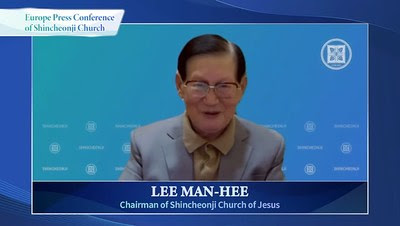NEW YORK, 22 février 2022 /PRNewswire/ — L’Église Shincheonji de Jésus a tenu une conférence de presse en ligne le 18 février à laquelle ont assisté des représentants des médias de 48 pays européens. L’événement a été marqué par l’intervention du président de l’Église Shincheonji, Man Hee Lee, et a fait suite à des conférences de presse organisées précédemment aux Philippines, aux États-Unis et en Afrique.

En réponse aux questions concernant le déclin du nombre de chrétiens en Europe, le président de l’organisation a souligné que les églises d’aujourd’hui ne fournissaient pas suffisamment d’explications sur le contenu de la Bible, étroitement lié à la vie quotidienne des individus et des communautés. Il a également déclaré que les prophéties détaillées de la Bible décrivaient des signes de ce qui devrait survenir dans le futur, et que témoigner de l’accomplissement de leur accomplissement avait conduit à une augmentation du nombre de membres de l’Église Shincheonji en Europe.
Lee a également expliqué que, selon la Bible, le nombre « 666 » mentionné dans le chapitre 13 de l’Apocalypse ne concernait pas la pandémie de COVID-19, mais qu’il s’agissait d’une parabole sur le roi Salomon, représentant une personne qui trahit Dieu au moment de l’Apocalypse. Il a ajouté que tout le Livre de l’Apocalypse était écrit sous forme de paraboles, qui peuvent être comprises « lorsque la prophétie (en paraboles) devient réalité. »
Un chef religieux participant à la conférence de presse a demandé au président Lee comment il en était venu à comprendre l’année, le mois, le jour et l’heure spécifiques du Livre de l’Apocalypse (chapitre 9) comme les paroles de la prophétie. Le président Lee a répondu : « Parce que je l’ai vu sur le site où l’événement s’est produit. Je rapporte ce que j’ai vu et entendu. »
Samuel Kabo, pasteur de l’Église réformée évangélique d’Alès en France, a également été émerveillé par la capacité du président Lee à fournir des détails spécifiques concernant l’accomplissement de l’Apocalypse. « J’ai été très impressionné que le président Lee ait témoigné sans même regarder le Livre de l’Apocalypse », a-t-il déclaré. « Et concernant certains événements tels que la sixième trompette, là encore il a été capable de donner une date. Comment a-t-il pu connaître cette date avec autant de précision, à l’heure près ? »
Un responsable de l’Église Shincheonji de Jésus en Europe a affirmé : « La pandémie de COVID-19 a apporté la maladie, la calamité et le malheur dans le monde entier, tout en limitant les activités religieuses. Le président Lee insiste sur le fait que le plus important est que nous interagissions les uns avec les autres, en faisant fi des religions. Nous espérons que cet événement sera l’occasion de restaurer le christianisme en Europe. »
Pour plus d’informations, veuillez nous contacter à l’adresse revelation@scjamericas.org.
Photo : https://mma.prnewswire.com/
